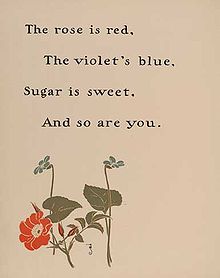music.wikisort.org - Composition
"Roses Are Red" is the name of a love poem and children's rhyme with Roud Folk Song Index number 19798.[1] It has become a cliché for Valentine's Day, and has spawned multiple humorous and parodic variants.
| "Roses Are Red" | |
|---|---|
 William Wallace Denslow's illustrations for "The rose is red", from a 1901 edition of Mother Goose | |
| Nursery rhyme |
A modern standard version is:[2]
Roses are red
Violets are blue,
Sugar is sweet
And so are you.
Origins
The rhyme builds on poetic conventions that are traceable as far back as Edmund Spenser's epic The Faerie Queene of 1590:
It was upon a Sommers shynie day,
When Titan faire his beames did display,
In a fresh fountaine, farre from all mens vew,
She bath'd her brest, the boyling heat t'allay;
She bath'd with roses red, and violets blew,
And all the sweetest flowres, that in the forrest grew.[3]
A rhyme similar to the modern standard version can be found in Gammer Gurton's Garland, a 1784 collection of English nursery rhymes published in London by Joseph Johnson:[4]
The rose is red, the violet's blue,
The honey's sweet, and so are you.
Thou are my love and I am thine;
I drew thee to my Valentine:
The lot was cast and then I drew,
And Fortune said it shou'd be you.[5]
Victor Hugo was probably familiar with Spenser, but may not have known the English nursery rhyme when he published his novel Les Misérables in 1862. A song by the character Fantine contains this refrain:[6]
Les bleuets sont bleus, les roses sont roses,
Les bleuets sont bleus, j'aime mes amours.
In his English translation published in the same year, Charles Edwin Wilbour rendered this as:[7]
Violets are blue, roses are red,
Violets are blue, I love my loves.
This translation replaces the original version's cornflowers ("bleuets") with violets, and makes the roses red rather than pink, effectively making the song closer to the English nursery rhyme.
Folklore
The short poem has since become a snowclone, and numerous satirical versions have long circulated in children's lore.[8] Among them:
Roses are red.
Violets are blue.
Onions stink.
And so do you.[9]
Country music singer Roger Miller parodied the poem in a verse of his 1964 hit "Dang Me":
They say roses are red and violets are purple
Sugar's sweet and so is maple syruple. [sic][10]
The Marx Brothers' film Horse Feathers has Chico Marx describing the symptoms of cirrhosis thus:
Cirrhosis are red,
so violets are blue,
so sugar is sweet,
so so are you.[11]
The Benny Hill version:
Roses are yellow
Violets are bluish
If it weren't for Christmas
We'd all be Jewish.[12]
Notes
- "Roud Folksong Index S299266 Roses are red, violets are blue". Vaughan Williams Memorial Library. English Folk Dance and Song Society. Retrieved 20 May 2016.
- Roud, Stephen (2010). The Lore of the Playground : One hundred years of children's games, rhymes and traditions. London: Random House Books. p. 420. ISBN 978-1-905211-51-7. OCLC 610824586.
- Spenser, The Faery Queene iii, Canto 6, Stanza 6: on-line text Archived March 4, 2016, at the Wayback Machine
- "Gammer G's Garland". British Library. Retrieved 2 January 2022.
- I. Opie and P. Opie (1951). The Oxford Dictionary of Nursery Rhymes (1997, 2nd ed.). Oxford University Press. p. 375.
- "Les misérables, Tome I by Victor Hugo". Project Gutenberg. (Book Seven, Chapter Six)
- Hugo, Victor (1862). Les Miserables. Translated by Wilbour, Charles E. New York: The Modern Library. p. 212.
- S. J. Bronner, American Children’s Folklore (August House: 1988), p. 84.
- Liz Gooch (18 May 2005). "Jill Still Playing Jacks And Hopscotch Endures". Archived from [hopscotch.com.au/hopscotch-articles/2005/5/18/jill-still-playing-jacks-and-hopscotch-endures/ the original] on 27 January 2014. Retrieved 17 September 2009.
{{cite web}}: Check|url=value (help) - Jimmie N. Rogers (1983). The Country Music Message, Revisited. University of Arkansas Press. p. 194. ISBN 9781610751148.
- "Selected bits from Horse Feathers".
- Lawrence Dorfman (2013). Snark! The Herald Angels Sing: Sarcasm, Bitterness and the Holiday Season. Skyhorse Publishing.
На других языках
- [en] Roses Are Red
[es] Roses Are Red
«Roses Are Red» es el nombre de un poema clásico de rimas para niños. También es una clase de poemas inspirados en ése. Tiene el número de 19798 en el Roud Folk Song Index.[1] Es usado sobre todo, comúnmente, como poema de amor, aunque también con motivo de burla, modificando los tres últimos versos por otros al gusto de quien lo hace, debido a su popularidad como cliché de poema genérico en la cultura anglosajona. Su versión más habitual es:[ru] Roses are Red
«Roses are Red» (с англ. — «розы красные») — короткое стихотворение, популярное в англоязычной среде. Традиционно связано с празднованием Дня святого Валентина и используется в валентинках. В Индексе народных песен Рауда имеет номер 19798[1]. Одним из наиболее устойчивых является следующий текст стихотворения: «Roses are red, / Violets are blue, / Sugar is sweet, / And so are you»[2] (с англ. — «Розы красные, / Фиалки синие, / Сахар сладкий, / Как и ты»)[3]. Широко распространены, в первую очередь среди детей, пародийные четверостишия, в которых сохраняются лишь первые две строки оригинала[4].Другой контент может иметь иную лицензию. Перед использованием материалов сайта WikiSort.org внимательно изучите правила лицензирования конкретных элементов наполнения сайта.
WikiSort.org - проект по пересортировке и дополнению контента Википедии